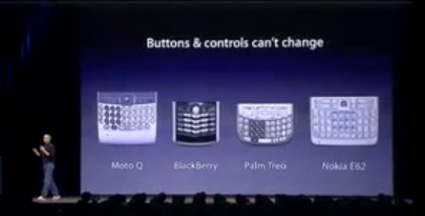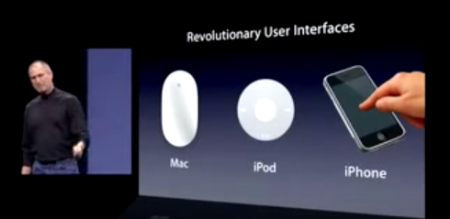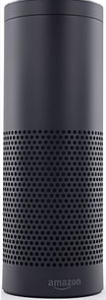Has Amazon Overthrown Apple as the 'I Hate Buttons' Leader?

Steve Jobs is notorious for hating buttons. Here's Jobs explaining the foulness of buttons during his famous iPhone introduction:
What's wrong with their [other phones] user interface? The problem with them is really sort of in the bottom 40. They all have these keyboard that are there whether you need them or not to be there. And they all have these control buttons that are fixed in plastic and are the same for every application. Well every application wants a slightly different user interface, a slightly optimized set of buttons just for it. And what happens if you think of a great idea six months from now? You can't run around and add a button to these things. They're already shipped. So what do you do? It doesn't work because the buttons and the controls can't change.
The iPhone solved the button problem with a new multi-touch screen and by using your finger as the pointing device (not a nasty nasty stylus). We all know how this works now, but it was novel back in the olden days.
The iPhone was one of three new products based on revolutionary user interface development: the mouse and the Macintosh; the click-wheel and the iPod; multi-touch and the iPhone.

UI innovation is not enough on its own. Creating a new product category requires a combination of advanced hardware and new supporting software. The Mac was a completely new everything. The iPod paired with iTunes. And the iPhone leveraged OS X, iTunes, and a lot of very smart code for dealing with touch.
That's the history lesson.
Something curious has happened. Amazon. Amazon has escaped the land of misfit phones and has developed three brilliant new products based on revolutionary UIs and sophisticated software systems:
- Amazon Dash Button - Rethinks the purchasing process making buying as simple as a single button press. What makes this possible is the immense distribution and fulfillment machine Amazon has created on the backend.
- Amazon Echo - Rethinks the digital assistant using a voice only conversational UI that requires no buttons. A very sophisticated software backend--AI based speech recognition, developer API, app store, developer portal, 3rd party integrations, cloud infrastructure supporting a national roll out--makes it all possible.
- Amazon Go - Rethinks the store purchase experience by removing the check out process. Software is key again: computer vision, sensor fusion, and deep learning. Remember Amazon's Fire Phone that could recognize over 100 million items in the real world? You do have to identify yourself to the system using a QR code, but one can imagine in the near future that visual identification will be sufficient. Since so much of the competitive advantage is in the software the system will only get more flexible and powerful as time goes by.



Each exploits leading edge technology to reduce friction. Each leverages the aggregation of customers Amazon has built using Amazon Prime. Each, most importantly, doubles as a data play. Using these products consumers make a bargain they are long used to by now: the trade of convenience for data. That's a new twist since the Jobsian era.
Echo and Dash are obvious collection points for interest signals. What may not be so obvious is that Echo has been a great way for Amazon to train their voice recognition system.
The store is a real coup. Can you imagine all the data a fully spy enabled store can provide? Of course your consumption habits will be under an ever more powerful microscope. How brand loyal are you? When can a sale switch your choice of products? What do you buy when? That's just the start. In-store cameras will track your every nuance. They'll know which products you pass by. They'll notice how long you gaze at certain products. They'll know which products you end up choosing and which ones you pick up and put back. Microphones may perform real-time sentiment analysis. Imagine every FBI profiler movie you've ever seen times 1000.
This isn't to say Apple hasn't done great things since or won't do great things again. That's expected. The Siri remote is elegant; those AirPods are marvels of engineering; and I can't wait to see what Apple is doing with AR.
But Amazon is a surprise. Amazon has been able to combine design, innovation, and manufacturing with their incredible software chops. None of this would possible without Amazon's ability to create sophisticated backend systems that can scale to hundreds of millions of consumers, suppliers, and products both in the physical and digital world. Who else can do that?
It would be a mistake to think these are just random technological developments. There's a system to the madness. To poorly channel Ben Thompson, Amazon is continuing their long term strategy of creating a choke-point in the commerce value chain. Everyone else is being forced to organize and modularize around Amazon as the tax collector on selling products. In a modular system it's the entity integrating the parts that earns the profit.
For now, Amazon leads in places Apple may find hard to follow.




